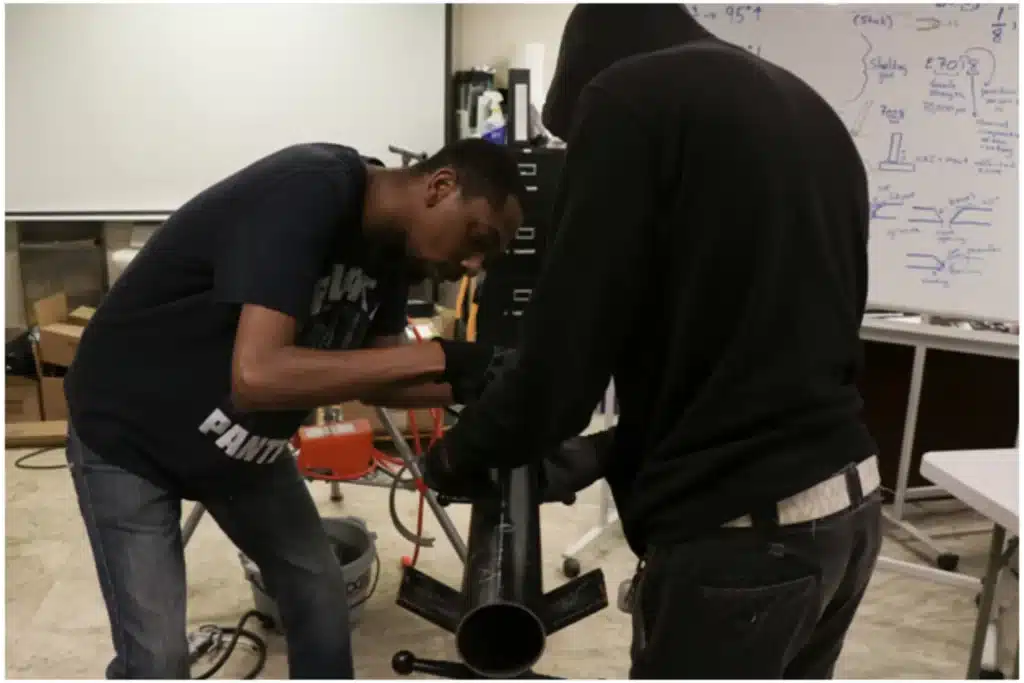If you’ve ever been astounded by the complex system of pipes that runs through buildings, powers utilities, and transports fluids, you’ve seen what industrial pipe-fitters do. Installation and upkeep of intricate piping systems, essential to many industries, are part of pipefitter training. We’ll go into pipe fitting in this blog, looking at how to become a licensed pipefitter and the many prospects available to individuals interested in pipefitter training. Let’s move through the pipeline of opportunities!
A pipefitter is a skilled worker trained under pipefitting trade programs to assemble, install, work with pipefitter tools, and fix piping systems used in industrial environments. Power plants, factories, refineries, and commercial structures all have these systems. Pipefitters use various materials, including plastic, steel, and copper, to ensure the efficient and secure passage of liquids and gasses. Their skills go beyond merely joining pipes; they must comprehend designs, make exact measurements, and use specialized instruments to build trustworthy and efficient piping networks.
Proper pipe fitter training course are required to become licensed pipefitters and plumbers. Aspiring individuals frequently start their careers by enrolling in comprehensive plumbing programs offered by technical or vocational colleges. These courses teach vital information about plumbing systems, pipe materials, and safety procedures. Additionally, they provide practical training that enables students to hone their abilities under the supervision of qualified teachers. They study plumbing by reading blueprints and comprehending the complexity of diverse industrial situations during the course.
Getting certified for pipefitter jobs is crucial if you want to grow in your career and be taken seriously as a competent pipe-fitter. A person’s skill is confirmed by certification, which also increases their professional reputation. The prerequisites for plumbing certification can change depending on the area and speciality, according to a number of organizations that give them. A certified pipe-fitter shows proficiency in their field, which opens doors to better employment prospects and increased earning possibilities.

Pipefitter jobs can be highly fulfilling for those who find the idea of creating and maintaining complicated infrastructure to be fascinating. A profession in pipefitting offers security, demand, and room for advancement. Construction, manufacturing, and the oil and gas industries are just a few of the industries that rely heavily on industrial pipefitters. Their knowledge is in high demand as they contribute to the efficiency and security of vital systems that power the world around us.
If you’re eager to start your pipefitting journey, look for pipefitting learning tools and information first. To learn more about the industry, research, network with experts, and join online communities. You’ll be on the right track to becoming a licensed plumber if you comprehend the fundamental principles of pipefitting. Embrace the learning process with passion and commitment because it will open the door to a rewarding and exciting pipe fitter training course.
Becoming a licensed pipefitter takes completing specified requirements established by regional licensing bodies to become a licensed plumber. After completing pipefitting trade programs, aspiring pipefitters must work as apprentices under seasoned experts. This time of the training offers beneficial on-the-job experience and real-world experience. Individuals can seek a journeyman plumber license after completing their apprenticeship, enabling them to work independently. The highest level of knowledge in the plumbing industry can be attained through accumulating experience and continuing your education.
Industrial pipe-fitting offers a rewarding professional path for those interested in the inner workings of complicated systems. Each step, from receiving pipefitter training to earning a pipefitting certification, lays a foundation of information and abilities. These qualified individuals, licensed pipefitters, assume the role of unsung heroes by assuring the uninterrupted flow of necessities for life. So, if you’re up for the challenge of becoming a certified pipe-fitter, embrace the road with passion and tenacity because a lucrative and fulfilling career in plumbing is waiting for you.
Read More:
Discover pipefitting possibilities at PTTI.Discover Program

Discover Endless Possibilities with pipefitting program at PTTI.
